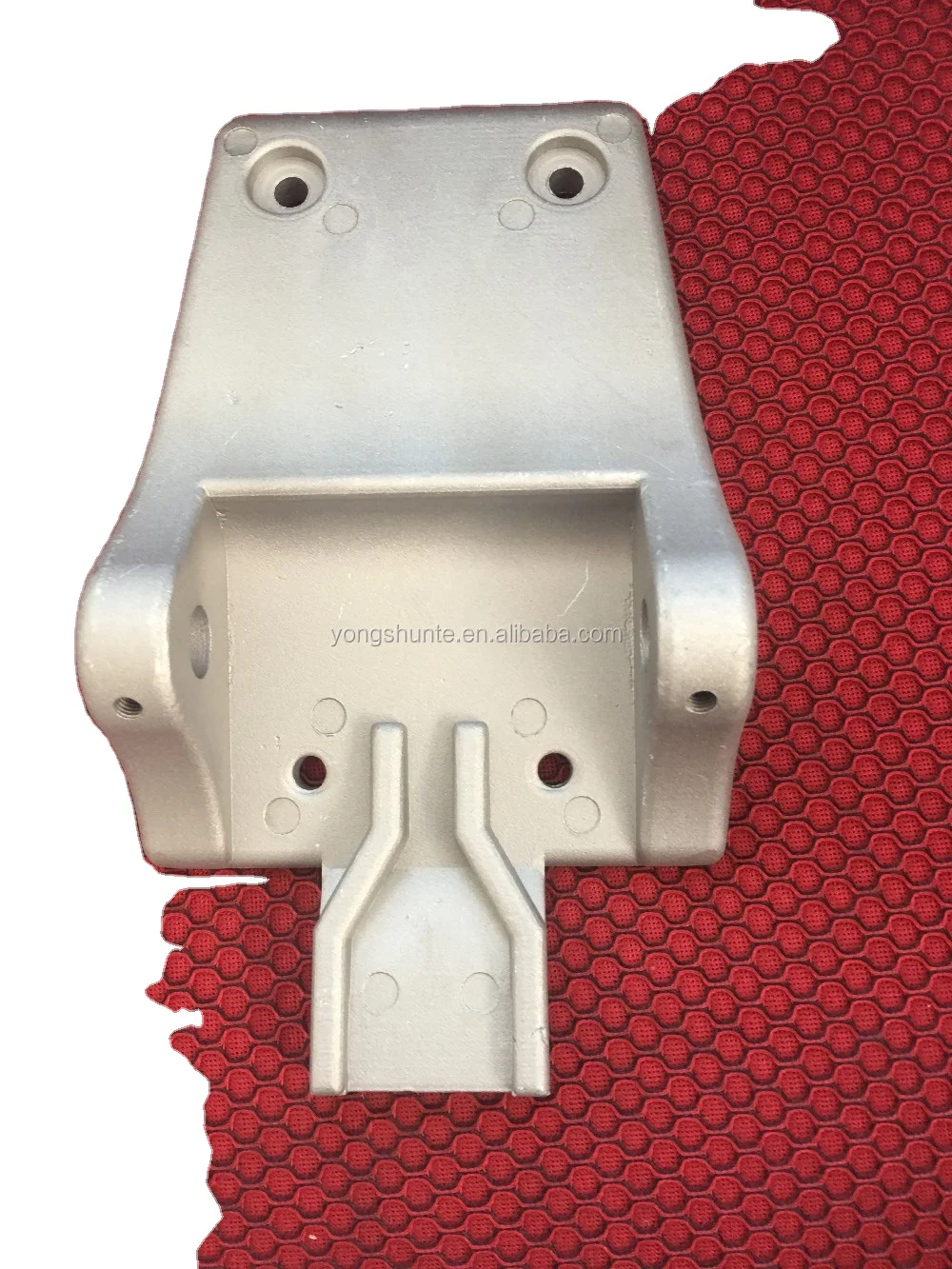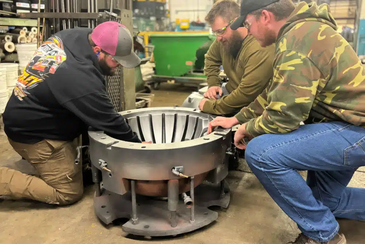The Future of Light Weight Aluminum Foundries: Technologies and patterns Forming the Market
The light weight aluminum shop industry is going through considerable makeover. Key patterns highlight the value of sustainability and efficiency. Innovations in clever production and automation are ending up being common. Foundries are progressively concentrated on using recycled products. This change questions regarding future techniques and technologies. Exactly how will these changes impact production methods and market dynamics? The responses may redefine the market landscape in unforeseen means.
Developments in Smart Production Technologies
As the light weight aluminum foundry market progresses, advancements in wise manufacturing technologies are ending up being significantly crucial for enhancing efficiency and performance. The assimilation of automation, expert system, and the Web of Points (IoT) is transforming conventional factory operations. These innovations enable real-time monitoring of procedures, enabling instant modifications that optimize output and lower waste.
In addition, maker learning algorithms analyze production information to determine patterns and forecast upkeep requirements, minimizing downtime. Robotics are significantly utilized for repetitive tasks, freeing proficient workers to concentrate on more intricate difficulties. In addition, electronic twins-- digital designs of physical processes-- facilitate simulations that can boost layout and operational techniques.
The adoption of these wise production technologies is driving affordable advantages in the aluminum shop market. By improving workflows and boosting decision-making abilities, foundries can fulfill growing market demands while maintaining high-quality criteria. The future of light weight aluminum foundries is undoubtedly connected to these technical developments.
Embracing Eco-Friendly Materials and Processes
The aluminum factory industry is progressively concentrating on eco-friendly products and procedures to improve sustainability. This shift consists of the fostering of sustainable product sourcing, energy-efficient production methods, and reliable recycling and waste administration strategies. By integrating these techniques, foundries aim to minimize their ecological influence while keeping competitiveness in the marketplace.
Sustainable Product Sourcing
Exactly how can light weight aluminum foundries improve their sustainability initiatives? Lasting product sourcing has emerged as an important method in attaining this goal. By prioritizing recycled light weight aluminum, shops can considerably reduce their ecological impact, as recycled products call for much less power and fewer sources contrasted to main light weight aluminum manufacturing. Furthermore, sourcing materials from licensed suppliers who adhere to environment-friendly methods promotes accountable mining and reduces eco-friendly influence. Foundries are likewise discovering alternate products, such as biopolymers and environmentally friendly coatings, to enhance conventional light weight aluminum procedures. Teaming up with stakeholders, consisting of distributors and ecological companies, cultivates technology in sourcing methods. Eventually, accepting lasting product sourcing not only lines up with global sustainability goals but likewise settings aluminum factories as leaders in ecologically accountable production.
Energy-Efficient Production Methods
Aluminum factories are significantly taking on energy-efficient manufacturing strategies to enhance their lasting product sourcing efforts. These techniques concentrate on lessening energy intake throughout the production procedure. Advanced innovations, such as induction melting and enhanced casting processes, are being applied to reduce the overall carbon impact. Furthermore, automation and smart manufacturing systems enhance functional effectiveness, permitting far better energy management. Shops are likewise exploring the assimilation of renewable resource resources, such as solar and wind, to power their operations. By focusing on energy effectiveness, aluminum factories not just reduced production expenses yet also align themselves with worldwide sustainability goals, guaranteeing a more ecologically liable strategy to aluminum production while meeting the climbing demand for green practices in the market.
Reusing and Waste Management
Accepting environment-friendly products and processes, aluminum shops are prioritizing recycling and waste management methods to boost sustainability in their operations. By integrating closed-loop systems, these centers are lessening waste and taking full advantage of resource performance. Scrap light weight aluminum, a conveniently available product, is being reused on-site, substantially decreasing the requirement for virgin materials and lowering power intake. Advancements in sorting and processing modern technologies even more promote the recycling of aluminum, guaranteeing that even polluted products can be repurposed properly. In addition, shops are embracing lasting techniques such as lowering hazardous waste and promoting the use of biodegradable materials for product packaging. This dedication to recycling not only decreases ecological effect but also improves the economic practicality of aluminum shops in an affordable market.
The Function of Automation and Robotics
Automation and robotics are increasingly transforming the light weight aluminum shop market, significantly enhancing production performance. By incorporating sophisticated modern technologies, foundries can decrease labor costs while all at once enhancing safety requirements for their workforce. This change not only streamlines procedures yet additionally positions the industry for lasting development in a competitive market.
Enhanced Manufacturing Effectiveness
Reinventing production procedures, the combination of sophisticated robotics and automation technologies has actually ended up being a cornerstone for light weight aluminum factories looking for improved performance. These technologies enhance process, lower cycle times, and improve item top quality by lessening human mistake. Automated systems can check production lines in real-time, enabling prompt adjustments that maximize output. On top of that, robotics facilitate the handling of dangerous materials, ensuring safer workplace while enhancing throughput. Anticipating maintenance modern technologies additionally add to efficiency by anticipating devices failings, thus lowering downtime. As an outcome, light weight aluminum shops can achieve higher consistency in their items while responding extra swiftly to market demands. This welcome of automation is setting a brand-new criterion for productivity and functional quality within the market.

Reducing Labor Costs
The change in the direction of progressed robotics and automation in light weight aluminum shops not just boosts manufacturing performance but also plays a substantial function in minimizing labor expenses. By integrating automated systems, foundries can reduce the reliance on manual labor, which frequently involves high wages and training expenses. Robotics simplify recurring jobs such as pouring, molding, and finishing, enabling a greater result with less employees. This technological change not only reduces labor-related prices however likewise improves uniformity and high quality in production. Moreover, automation can run all the time, making the most of functional hours without the associated prices of overtime or change differentials. Therefore, light weight aluminum foundries can achieve substantial cost savings while preserving affordable pricing in an evolving market landscape.
Improving Safety Criteria
While typical light weight aluminum foundry operations frequently reveal workers to dangerous environments, the assimilation of robotics and automation significantly boosts safety criteria within the industry. Automated systems can do risky tasks, such as liquified metal handling and heavy training, minimizing human exposure to dangerous conditions. Additionally, robotics can run in severe temperature levels and toxic ambiences, successfully minimizing the danger of injury. Advanced monitoring innovations and expert system guarantee real-time safety evaluations, enabling instant actions to possible hazards. Automation improves process, decreasing the probability of crashes created by human error. Therefore, the adoption of these innovations not only enhances safety and security yet additionally promotes an extra effective and reliable workplace in light weight aluminum factories.
Enhancing Power Performance in Manufacturing
As light weight aluminum shops look for to preserve competitiveness in a progressing market, enhancing power effectiveness in production has emerged as a vital focus. By adopting innovative modern technologies such as high-efficiency melting heaters and automated temperature level controls, shops can significantly decrease energy intake. Applying real-time tracking systems permits specific monitoring of Check This Out energy use throughout the manufacturing process, allowing quick changes to enhance efficiency.
In addition, shifting to alternative power resources, including renewable alternatives, can additionally reduce the carbon impact. The integration of energy healing systems, which reclaim waste warmth for reuse, is ending up being increasingly usual. Training personnel in energy management methods guarantees that every person included in the manufacturing process is conscious of power usage.
These campaigns not just reduced functional costs however likewise straighten with worldwide sustainability objectives, positioning light weight aluminum shops as accountable players in the sector while boosting their general competition. - Aluminum Casting Company
Innovations in Recycling Light Weight Aluminum
Developments in recycling aluminum have actually gained momentum together with efforts to enhance power performance in manufacturing. The aluminum industry has embraced advanced technologies that improve the reusing procedure, reducing energy intake and environmental impact. Strategies such as hydrometallurgy and new sorting technologies improve the extraction of aluminum from scrap, enhancing yield rates and ensuring better recycled product.
The advancement of closed-loop recycling systems permits foundries to recycle aluminum without considerable deterioration in top quality, making the process more lasting. Developments in logistics and collection, consisting of improved tracking systems and automated sorting, have actually likewise played an essential role in boosting the performance of light weight aluminum recuperation. These improvements not only contribute to a round economic climate however also assist alleviate the carbon impact connected with aluminum manufacturing. As the demand for lasting methods expands, these technologies place the aluminum factory market as a leader in accountable source management.
Replying To Market Demands and Consumer Trends
Flexibility has actually ended up being a keystone for aluminum factories reacting to developing market demands and customer patterns. As markets progressively focus on sustainability, light weight aluminum foundries are changing in the direction of environment-friendly techniques, consisting of enhanced reusing procedures and reduced carbon footprints. This change straightens with consumer choices for eco accountable products, driving shops to innovate their offerings.
Additionally, the rise of lightweight materials in automotive and aerospace industries necessitates innovations in aluminum alloys and casting strategies. Foundries are purchasing r & d to create high-strength, light-weight parts that fulfill stringent performance requirements.
Customization has actually gotten traction, with consumers seeking customized remedies. Aluminum shops are leveraging innovative production innovations, such as 3D printing, to fit specific customer needs effectively. This responsiveness not only satisfies customer needs but additionally placements light weight aluminum shops competitively in a dynamic market landscape, guaranteeing their importance in an ever-changing industrial atmosphere.

Regularly Asked Inquiries
Just How Do Light Weight Aluminum Foundries Impact Citizen Economies?
Aluminum foundries considerably influence neighborhood economic climates by producing tasks, promoting demand for regional vendors, and contributing to neighborhood growth. Their operations commonly lead to enhanced tax revenues, which can money essential public solutions and infrastructure enhancements.
What Are the Safety Rules for Light Weight Aluminum Foundry Workers?
Security laws for aluminum foundry workers include mandatory individual safety devices, appropriate ventilation systems, normal training on hazardous products, and adherence to standards set by occupational wellness and safety and security administrations to lessen dangers and warranty worker safety and security. - Aluminum Casting Company
Just How Does Light Weight Aluminum Recycling Affect Global Supply Chains?
Light weight aluminum reusing substantially reduces need for raw products, enhances source effectiveness, and stabilizes rates. This shift effects global supply chains by cultivating a round economic situation, promoting sustainability, and ensuring a much more durable market in like it changing markets.
What Occupation Opportunities Exist in the Light Weight Aluminum Shop Market?
Various career opportunities exist in the aluminum foundry industry, consisting of roles in engineering, quality assurance, manufacturing management, and r & d. Competent labor settings such as mold and mildew manufacturers and machine operators are likewise sought after.
How Do International Trade Plans Influence Aluminum Foundries?
International trade policies significantly influence light weight aluminum shops by influencing import tariffs, supply chain dynamics, and market access. These factors can affect functional costs, competitiveness, and total productivity within the international light weight aluminum production landscape.
By focusing on recycled light weight aluminum, foundries can greatly lower their environmental footprint, as recycled products require much less Continued power and fewer sources compared to primary light weight aluminum production. Light weight aluminum factories are progressively adopting energy-efficient manufacturing strategies to complement their lasting product sourcing efforts. Automation and robotics are significantly changing the aluminum foundry industry, significantly improving manufacturing effectiveness. The change towards progressed robotics and automation in aluminum shops not only boosts production efficiency however likewise plays a substantial function in minimizing labor costs. As light weight aluminum foundries look for to preserve competitiveness in an evolving market, improving energy performance in manufacturing has arised as a vital emphasis.